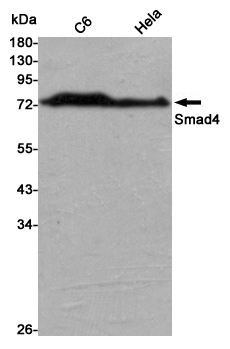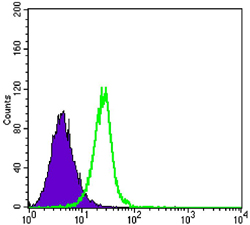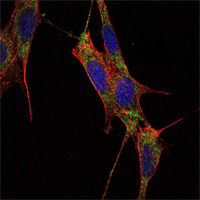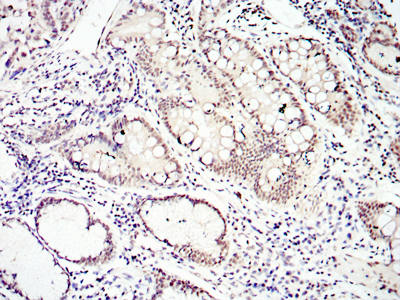-
Product Name
Anti-Smad4 Mouse antibody
- Documents
-
Description
Smad4 Mouse monoclonal antibody
-
Tested applications
WB, IHC-P, ICC/IF, FC
-
Species reactivity
Human, Mouse
-
Isotype
Mouse IgG1
-
Preparation
Antigen: Purified recombinant fragment of human SMAD4 expressed in E. Coli.
-
Clonality
Monoclonal
-
Formulation
Ascitic fluid containing 0.03% sodium azide.
-
Storage instructions
Store at 4°C short term. Store at -20°C long term. Avoid freeze / thaw cycle.
-
Applications
WB: 1/500 - 1/2000
IHC: 1/200 - 1/1000
ICC: 1/200 - 1/1000
FC: 1/200 - 1/400
ELISA: 1/10000
-
Validations

Western blot detection of Smad4 in C6 and Hela cell lysates using Smad4 mouse mAb (1:1000 diluted).Predicted band size:65KDa.Observed band size:70KDa.

Flow cytometric analysis of K562 cells using SMAD4 mouse mAb (green) and negative control (purple).

Immunofluorescence analysis of NIH/3T3 cells using SMAD4 mouse mAb (green). Blue: DRAQ5 fluorescent DNA dye. Red: Actin filaments have been labeled with Alexa Fluor-555 phalloidin.

Immunohistochemical analysis of paraffin-embedded lung cancer tissues using SMAD4 mouse mAb with DAB staining.
-
Background
Swiss-Prot Acc.Q13485.Common mediator of signal transduction by TGF-beta (transforming growth factor) superfamily; SMAD4 is the common SMAD (co-SMAD). Promotes binding of the SMAD2/SMAD4/FAST-1 complex to DNA and provides an activation function required for SMAD1 or SMAD2 to stimulate transcription. May act as a tumor suppressor。Mutations or deletions in this gene have been shown to result in pancreatic cancer, juvenile polyposis syndrome, and hereditary hemorrhagic telangiectasia syndrome.
Related Products / Services
Please note: All products are "FOR RESEARCH USE ONLY AND ARE NOT INTENDED FOR DIAGNOSTIC OR THERAPEUTIC USE"
